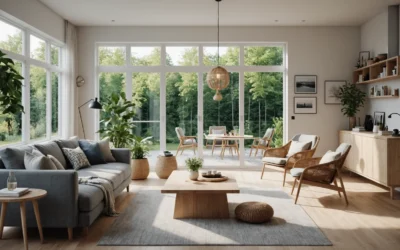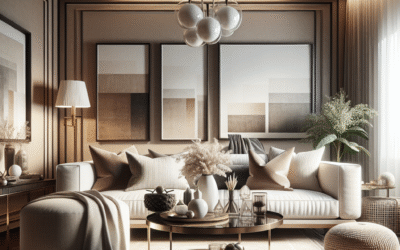
Why Minimalist Bedrooms are Trending (and Why You Should Care)
Okay, so, minimalist bedrooms. You’ve probably seen them all over Pinterest, right? All those perfectly curated spaces with, like, three things in them. But here’s the thing: it’s not just about aesthetics. A minimalist bedroom is a sanctuary, a place where you can actually unwind after a crazy day. Think about it: less clutter, less stress. It’s a pretty direct correlation. And in our hectic lives, who doesn’t need a little more serenity?
Honestly, the trend isn’t just about looking good; it’s about feeling good. We’re bombarded with so much stuff all day, every day—emails, notifications, endless to-do lists. Your bedroom should be the antithesis of all that chaos. It’s your personal retreat.
Decluttering 101: Getting Rid of What You Don’t Need
Right, so where do we even start? Decluttering can feel… overwhelming, to say the least. But it’s absolutely essential. The aim is to purge anything that doesn’t spark joy or serve a purpose. Sound familiar? Marie Kondo definitely knew what she was talking about. And you know what? She’s still right! Seriously. Don’t overthink it.
Let me explain something that I only recently realized. Decluttering isn’t just about getting rid of stuff. It’s about making conscious decisions about what you want to keep in your life. It’s about valuing quality over quantity.
- Start small: Don’t try to tackle the entire room at once. Pick a drawer, a shelf, or a corner.
- The one-year rule: Haven’t used it in a year? Probably don’t need it. Be honest with yourself.
- The “joy” test: Does it make you happy? If not, donate, sell, or toss it.
- Be ruthless: This is the hard part, but it’s necessary. Sentimental value can be a trap!
You know what? Take a deep breath. It’s okay to take breaks. Decluttering can be emotionally taxing, especially if you’re dealing with sentimental items. Don’t get discouraged; Rome wasn’t decluttered in a day!
Choosing a Minimalist Color Palette: Less is More
Color is, well, powerful stuff. It can affect your mood, your sleep, and even your energy levels. When it comes to a minimalist bedroom, the key is simplicity. Think calming, neutral tones. You’re not painting a clown college; you’re creating a peaceful haven.
Here’s the thing: it’s not just about white (although white is a classic for a reason—it’s clean, bright, and makes the space feel larger). But consider soft grays, muted blues, or even earthy greens. Stay away from anything too vibrant or stimulating. Remember, the goal is to create a sense of calm. Honestly, even I sometimes have to remind myself of that!
- Neutrals are your friend: Whites, grays, beiges, and creams are all excellent choices.
- Keep it consistent: Use the same palette throughout the room to create a cohesive look.
- Add subtle accents: If you want a pop of color, use it sparingly. One or two cushions or a small piece of artwork can do the trick.
And don’t forget about texture! You know, a chunky knit blanket or a linen duvet cover can add depth and interest without adding visual clutter. It’s all about creating a sensory experience that’s soothing, not overwhelming. Think along the lines of ASMR for your eyeballs!
Essential Minimalist Furniture: Quality Over Quantity
Furniture is where minimalism really shines. Instead of cramming your room with unnecessary pieces, focus on a few high-quality, functional items. Think of it as an investment in your well-being. After all, you spend a third of your life sleeping, right?
Here’s the thing; each piece of furniture should serve a purpose and contribute to the overall sense of calm. No more “just because” furniture. Does that make sense?
- A comfortable bed: Obviously. Invest in a good mattress and quality bedding.
- A simple nightstand: Enough space for a lamp, a book, and maybe a glass of water.
- A dresser or closet: Keep your clothes organized and out of sight.
- Maybe a chair: If you have the space, a comfortable chair can be a nice addition for reading or relaxing.
Let me explain why quality really matters here. A well-made bed frame, for example, will not only last longer but also look better and feel more comfortable. It’s about choosing pieces that are built to last and that you truly love. And honestly, you’ll probably save money in the long run by buying fewer, better things.
Lighting is Everything: Creating the Right Ambiance
Lighting can make or break a room. In a minimalist bedroom, soft, warm lighting is key. Harsh, bright lights can be jarring and disruptive to sleep. Think hygge, but make it minimalist. You know what I mean?
Here’s the thing: lighting isn’t just about functionality; it’s about creating a mood. You want your bedroom to feel inviting and relaxing, not like a sterile operating room.
- Ditch the overhead lights: Use lamps instead. Table lamps, floor lamps, even wall sconces can create a softer, more ambient light.
- Warm light bulbs: Look for bulbs with a color temperature of around 2700K. These emit a warm, yellow light that’s perfect for relaxation.
- Dimmer switches: A dimmer switch allows you to adjust the brightness of your lights to suit your mood.
- Natural light: Maximize natural light during the day by keeping your windows clean and your curtains open.
I found this hack recently that’s worth it. Get some smart bulbs that you can control with your phone or voice. Total game changer! You can adjust the brightness and color temperature without getting out of bed. Now that’s what I call minimalist living.
Storage Solutions: Keeping Clutter Out of Sight
Storage is the unsung hero of a minimalist bedroom. The goal is to keep everything organized and out of sight. Because, honestly, even the most beautiful room can feel chaotic if it’s cluttered. Remember, a place for everything, and everything in its place.
Let me explain something about storage, too. It’s not just about hiding things; it’s about creating a system that works for you. And the system has to be sustainable!
- Under-bed storage: Perfect for storing seasonal clothing, extra blankets, or shoes.
- Built-in closets: If you’re renovating, consider built-in closets to maximize space.
- Floating shelves: A great way to display a few carefully chosen items without taking up floor space.
- Baskets and bins: Use baskets and bins to corral smaller items like socks, underwear, or toiletries.
You know what? Invest in storage solutions that you actually like. If you find the standard options boring, you’re less likely to use them and you’ll probably just end up throwing things everywhere.
Bringing in Nature: Adding Life to Your Minimalist Space
Even in a minimalist space, a touch of nature can make a big difference. Plants can purify the air, add a pop of color, and create a sense of calm. And honestly, who doesn’t love a little greenery?
Here’s the thing: Plants aren’t just decorative. They can actually improve your well-being! Studies have shown that plants can reduce stress, improve air quality, and even boost your mood.
- Low-maintenance plants: Snake plants, ZZ plants, and succulents are all easy to care for.
- Hanging plants: A great way to add greenery without taking up floor space.
- Fresh flowers: A simple bouquet can brighten up the room and add a touch of elegance.
One thing I’ve learned the hard way: Be mindful of allergies! If you’re prone to allergies, avoid flowering plants or plants with strong fragrances.
Personal Touches: Making it Your Own
Minimalism isn’t about being sterile or impersonal. It’s about creating a space that reflects your values and your personality. Feel free to inject personal touches! So what’s the best way of doing that?
Here’s the trick: it’s about being intentional with your choices. Each item should have a purpose or a meaning. This is about quality over quantity, remember.
- Artwork: Hang a few pieces of artwork that you love.
- Books: Display your favorite books on a shelf or nightstand.
- Photographs: Frame a few personal photographs
- Sentimental items: Keep a few small items that have special meaning to you.
And don’t be afraid to change things up from time to time! Minimalism is a journey, not a destination. Experiment with different layouts, colors, and accessories until you find what works best for you.
Maintaining Your Minimalist Bedroom: Staying Clutter-Free
So, you’ve created your minimalist bedroom. Congrats! But the work isn’t over. You need to maintain it. Otherwise, you’ll be back to square one in no time. Trust me, I’ve been there. Maintaining it is really important
And here’s the thing: maintenance isn’t just about tidying up; it’s about forming good habits. A little bit of prevention is worth a lot of cure.
- Make your bed every day: It’s a small thing, but it makes a big difference.
- Put things away immediately: Don’t let clutter accumulate.
- Declutter regularly: Go through your belongings every few months and get rid of anything you no longer need.
- Be mindful of what you bring into the room: Before you buy something new, ask yourself if you really need it.
Honestly, it all comes down to being mindful and intentional. Think back to the points we talked about earlier. Remember why you wanted a minimalist bedroom in the first place. Now, every time you are tempted to add clutter, remind yourself of that original goal, and you’ll be well on your way.
Resources for Minimalist Inspiration
Need some more ideas? Here are a few resources where you can find minimalist inspiration:
- The Spruce: Minimalist Bedroom Ideas – Great for design ideas.(opens in a new tab)
- Becoming Minimalist – A blog dedicated to minimalist living.(opens in a new tab)
- YouTube: Minimalist Bedroom Tours – See how other people have created their minimalist bedrooms! (opens in a new tab)
One Last Thought From Me
Creating a minimalist bedroom might seem daunting, but it’s totally possible with intention and planning. You’re not trying to achieve perfection here; the goal is to create a space that supports your well-being and promotes restful sleep. So, take your time, think about what you really need, and enjoy the process. Trust me, you’ll have a sanctuary to recharge in.
FAQ: Quick Answers to Your Burning Questions
DISCLAIMER
The information provided in this guide is for general informational purposes only. Creating a minimalist bedroom depends on your particular circumstances. Consult with professionals before making any significant changes. The author and publisher are not responsible for any errors or omissions, or for any actions taken based on the information provided in this guide.
Categories
- Accent Walls & Ceilings (84)
- Art Curation & Gallery (83)
- Bedding Style Trends (89)
- Bedroom Makeover (96)
- Bohemian & Eclectic Styles (80)
- DIY & Budget-Friendly Decor (78)
- Eco-Friendly Design (83)
- Furniture Care (87)
- Home Decor & Design Ideas (181)
- Home Wellness Spaces (103)
- Integrated Outdoor Living (91)
- Japandi Style (84)
- Kids and Nursery Decor (73)
- Living Room Decor (99)
- Mix & Match Techniques (95)
- Modern & Contemporary Design (88)
- Rug Sizing & Placement (89)
- Scandinavian Design Inspiration (51)
- Seasonal Home Decor (100)
- Small Space Solutions (93)
- Wall Art & Painting Tips (94)
Recent Comments
Archives
Product Gallery
-
Majestic African Wildlife Canvas Art for Stylish Home Decor
Rated 5.00 out of 5 -
Cozy Irregular Green Plush Rug for Nordic Living Spaces
Rated 5.00 out of 5$51.90 – $327.31Price range: $51.90 through $327.31 -
Scandinavian Geometric Area Rugs for Stylish Home Décor
Rated 5.00 out of 5$38.90 – $589.26Price range: $38.90 through $589.26













